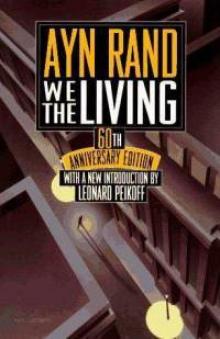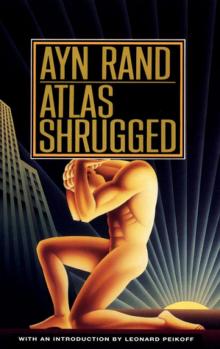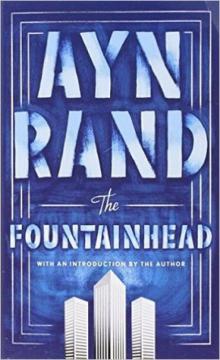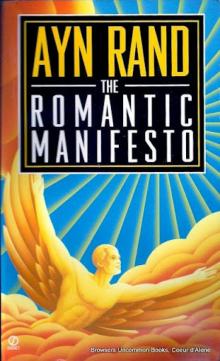The Journals of Ayn Rand Read online
Page 34
A man’s mind is an attribute of his self, of that entity within him which is his consciousness. That entity can be called spirit. It can be called soul. It remains—no matter what its origin—a man’s self. His “I.” His ego.
If to preserve the independence of his mind is man’s first moral duty, what choice is he to make when his thinking clashes with the thoughts and convictions of others? Such a clash occurs at every step of a man’s life, most particularly when his thinking results in a new, original discovery—as every new discovery must originate in one brain, that is, with one man, and therefore must be apart from or in opposition to whatever convictions men previously held on that subject. What is man’s choice in such a conflict? It is a choice of authority. “I think” or “They tell me.” Whose authority is he to accept? Upon whose authority is he to act? Who must be placed first: his ego or other men?
The independence of man’s mind means precisely the placing of his ego above any and all other men on earth. It means acting upon the authority of his ego above any other authority. It means keeping his ego untouched, uninfluenced, uncorrupted, unsacrificed.
In the realm of man’s mind, the principle of altruism—the placing of others about self—is the one act of evil, the original sin. [Marginal note on the last two paragraphs:] Good!
Man’s virtues are the qualities required for the preservation of his independence. They are personal qualities, unsocial by their nature and antisocial in any conflict of man against man. They are unsocial, because man cannot derive them from other men, cannot receive them as a gift from an outside source, but must generate them from within his own ego. They are profoundly selfish virtues, for they proceed from his ego, pertain to his ego and cannot be sacrificed to any consideration whatsoever. Without these virtues man cannot survive nor remain man.
Integrity—the first, greatest and noblest of all virtues—is a synonym of independence. Integrity is that quality in man which gives him the courage to hold his own convictions against all influences, against the opinions and desires of other men; the courage to remain whole, unbroken, untouched, to remain true to himself. It is generally recognized that a man who is true to himself is a man to be admired. But the sloppy confusion of human thinking has prevented men from understanding their own words or hearing what they are actually saying. “True to himself”—what does that mean? True to his own ego. True to the duty of holding his ego apart from all other men—above them and against them when necessary. A man of integrity cannot place others above self. Here again, the principle of altruism is an act of evil.
The virtue of courage is the strength to face any threat and to fight back. Fight what? Nature, as well as other men when necessary. If, however, one must place others above self—then it is evil to resist them; then one must surrender if a conflict arises. But the man of courage is the one who does not surrender. In an issue of courage, altruism becomes cowardice—an act of evil.
The virtue of honesty is implicit in the function of the rational faculty. Man requires the greatest, the most ruthless honesty of observation and reasoning in order to reach as correct a conclusion as his rational capacity will permit. A man willing to fool himself will collapse—and does—in his first attempt at thought. The incentive to dishonesty comes when man deals with other men. What is the exact procedure of a dishonest action? A man says a thing which he knows to be untrue or commits an act which he knows to be wrong—in order to obtain something from other men or achieve some end that depends upon others. Whether he does it for personal gain or for any other reason, does not alter the procedure. The motive is irrelevant to the nature of the action. The nature of the action is that man acts upon what he believes to be agreeable or desirable to others, not upon his conception of the truth, that he acts to deceive others, they are his first concern, they determine his conduct. This is the placing of others above self. The procedure of dishonesty is the procedure of altruism—and an act of evil.
A sense of honor is a selfish virtue by definition, because it implies the honor of one’s own self. Of one’s ego. A man with a sense of honor will not submit to certain things nor permit them to be done to him—the things which he considers dishonorable. Dishonorable to whom? To him. Will not permit them to be done—by whom? By other men. What, then, does a sense of honor require? The placing of self above others. The principle of altruism applied here would become abjectness and depravity—an act of evil.
The virtue of self-confidence is made clear by the very term. It is not confidence in others, nor reliance upon others, but confidence in one’s own ability, in one’s strength, one’s courage, one’s judgment, one’s vision. Confidence in one’s own ego. When is this virtue called upon? In a conflict with others. Here altruism would mean trust in anyone and everyone above self-the behavior of a Milquetoast of the spirit—an act of evil.
The virtue of strength implies all the same considerations. Strength of character, strength of will, strength of spirit—all attributes of the ego, needed in conflict with others, all making an application of the principle of altruism an act of evil.
The love of freedom is a synonym of independence. Freedom from what? Nothing can take a man’s freedom away from him—except other men. Freedom means freedom from others. A man who places others above self should have no objection to being a slave. In fact, that is the condition he should desire. Here altruism means enslavement—an act of evil.
A sense of justice is an intellectual quality—totally selfish, because it cannot be exercised except through one’s own judgment, one’s own rational faculty. Here man cannot accept the pronouncement of others, as he cannot accept it in any process of reason. A just man acts upon that which he has concluded to be just. If he places others above self in a matter of justice, he is committing the equivalent of joining a lynch mob. Here altruism assumes one of its blackest forms of evil.
The virtue of wisdom implies all the same considerations as above. One cannot be wise except through one’s own brain and acting upon one’s own thoughts. It is not necessary to repeat what altruism would mean here.
All these virtues are contained in, enhanced by, based upon one fundamental virtue—that of self-respect. Self-respect is implied in each of them. A man who does not respect himself can have no integrity, no courage, no honesty, no honor, no strength, no wisdom, no virtue of any kind. Self-respect implies that a man considers himself an entity of value—a purely egotistical consideration.
These virtues are primary. They pertain to the realm of man’s mind and spirit. And in that realm, altruism is either impossible or evil, or both. [...]
September 30, 1944
The relation of the immediate and the long-range in morality. (The impression that “evil pays.”)
After we have defined the good and the evil—what are the proper methods of fighting the evil?
A Peter Keating [type might make the] argument: “Since I have a second-hander’s social talent, why should I not exercise it to the limit and get more than I could by my own ability?” Here comes the question of the proper relation between the primary and the secondary matters, between basic individualism and functioning in a society of exchange.
(Note on a good argument about the position of an unemployed man in a capitalist society: the primitive condition of fighting nature directly is always open to him (Pat’s argument), but the advantages left to him by others, by civilization, more than balance the hazard of having to seek employment through other men. He is asking for a chance created for him by others.)
Think very thoroughly on the relation of theory to practice, covering every possible instance where it looks as if theory does not have any meaning in practice. Is it in any sense true that in a free society a basic right can become meaningless and without application? Analyze cases such as: cameramen blacklisted by Hollywood ([Albert Mannheimer‘s] question); the closed shop disaster to the New York stage (you are not forced to deal with established producers, but in practice it means that you cannot have a producer); the hypothetical case of a monopoly (say, telephone) free to refuse services to an individual or a group of men or a branch of business.
In this last case, it is obvious that the inventor’s monopoly has such an absolute right. Does it mean, however, that individualism then degenerates into its opposite in practice, into collectivism? Has the size of an enterprise (made possible by the scope covered by modern inventions) anything to do with it? In other words, does an invention such as the telephone give the individual who controls it a collectivist’s power by the sheer size of his business? (No, I think.)
Granted that such monopolies would be destroyed by counter-inventions, if man’s ingenuity is left free—what happens to individual victims in the meantime? (Here again, the relation of the immediate and the long-range.) Also, a single individual denied service by one of these gigantic enterprises has no recourse unless there is a collective of men in his position—or else no competitor will start to compete against the monopoly. Is there a principle involved in such a possibility? Is there a possibly legitimate argument that if huge private companies control everything—individualism becomes meaningless in practice? (No, I think.)
Still, the point here seems to be size. Before modern inventions, enterprises were within the personal scope of one man’s control and ability. Modern inventions seem to make enterprises “collective” in scope and nature. (I may be terribly wrong here, but I must analyze this “seeming.”) A man can compete against a hand forge—can he compete against the Radio Corporation of America? The main point is: does he have to compete? Is there or is there not room left for individualism in practice—under the most extreme consequences of “laissez-faire” that can be imagined and legitimately supposed to happen?
This is probably the point at whi
ch people now go in for collectivism and statism. Since collectivism is not the solution, but only the complete surrender into the very evil one is opposing—is there a solution? Or is it that civilization must periodically collapse because it always becomes collectivism and stops? And that the moment any economic activity grows beyond the “controllable capacity” of one man—the limit has been reached and we go into the dark ages again? All of these questions are probably nonsense—but an awfully clear statement and definition is needed.
Here is the seeming contradiction: mass production gives inestimable advantages to the individual through the cheapness of products made possible by a “collective” of customers—but then the individual is tied to that collective task. Or is he? It’s individual inventors and producers that make mass production possible. It’s individuals and minorities that support new inventors and teach the masses to appreciate them. Obviously, it starts with prime-movers and followers. But what about the results? Here again, a most careful statement of the relation between individualism and a society of exchange is needed.
Does all this mean that an individual acquires “collective” power through a great invention that becomes a mass industry, and that to compete with him, or to be independent of him, another man needs “collective” power?
And if we say that voluntary collectives (such as unions, closed shops, employers’ agreements) are evil, but cannot be stopped by law—and we rely only on men’s wisdom and proper choice—will it work in practice? Since the majority are second-handers by nature, will they necessarily and always destroy a free system by starting with voluntary collectivism? If the prime movers are clear on the idea that there must be no state interference, but the second-handers are the majority with the political power, then is every civilization only to have a very brief period (such as Greece’s 150 years and America’s 150 years) before the second-handers unavoidably destroy it? Just a brief period of magnificence once in many, many centuries—and then destruction? Is that the inevitable fate of mankind? Is it basic and eternal—a small group of prime-movers feeding the rest and being destroyed by those they feed? (For The Strike.) [The Strike was the working title for Atlas Shrugged; this is the first reference to the novel in her notes.]
Or are second-handers in the majority? That, perhaps, is the heart of the question. Maybe not. Maybe Pat is right—the fault is in men’s thinking, not in man’s nature. (Think, think, think on this point.)
Granted that collectivism and statism are brought about by minorities—as [Ludwig] von Mises proves. What can the minority of prime-movers do about it? Are the collectivists’ methods open and proper to prime-movers? Won’t the majority always follow the collectivists if given a clear choice? (No, I think.) Isn’t it actually true that even among collectivists and statists it is always a prime-mover off the track who does the real damage?—so that the world is destroyed by the Wynands, not the Tooheys? (I think so.) [Here AR is grasping an idea essential to Atlas Shrugged: that evil is impotent—it has no power except that which the good grants it.] But if so—can it ever be stopped? What can stop prime-movers from going off the track for one reason or another? I suppose the answer is: Nothing. There is no automatic fool-proof and error-proof [way]. If there were, there would be no free will. Nothing can ever replace man’s necessity to make a free, conscious choice—the necessity of an effort of reason. All we can do is indicate the right way, the proper principles—and then fight, fight, and fight for them.
That a man knows the right idea is not enough. He must still act upon it. There are, then, two acts of the free will: the will to know the truth and then the will to act upon it. The first does not lead automatically to the second.
October 25, 1944
In answer to the question “If a morality is not based on the common good, what is it then based on?”: on a definition of the moral individual and on that which is good for him. The moral individual is the best and highest possible to man. By what standard? By the essence of man’s nature. The man living in accordance with his nature is the moral man and the “surviving” man—he carries the life force, the life principle, he is the self-renewing “energy” and the fountainhead. What is man’s nature? Man is a reasoning being.
And since morality is a matter of free will, open to all but the insane—the good of the moral man is good for all, i.e., for all those who wish to be moral.
What is good? That which is in accordance with the life principle of man. The independent, the self-reverent, the self-sufficient.
Do I set myself up as an arbitrary elite and formulate a morality for my own kind of elite, at the expense of others? No, because it is not to be enforced upon “others” or anyone. “Others” are free not to accept it and not to subscribe to it; they may have their own kind of collectivism, altruism or whatever they wish. But they are not free to enforce it upon me and my “elite”—they are not free to arrange their collectivism at our expense. The objective dividing line is: no man exists for the sake of another man. There can be no moral justification for a collectivism [forcibly imposed] on one man for the sake of the others. But, the collectivists would say, our survival depends upon enslaving this exceptional individual; haven’t we a right to do it? No. First, it does not and cannot depend upon such enslavement; second, if it did, it would not work just the same, the enslaved creator would not save them; third, if it did, it would still be evil and no such universe is worthy of existence, so that it would be moral to let the collective, the creator, and the world go to hell altogether.
This point—no man exists for the sake of another man—must be established very early in my system. It is one of the main cornerstones—and perhaps even the basic axiom. [For AR’s final view of this issue, see the introduction to The Virtue of Selfishness.]
In relation to my earlier notes on individual competition against big near-monopolies: take notice of Mr. Hazen’s complaint about the impossibility of an independent producer competing with big movie companies because “the big companies won’t loan their stars to independents.” [Joseph Hazen was president of Hal Wallis Productions.] Mr. Hazen wants to compete with ready-made tools to be handed over to him by the competition. He doesn’t want to start at the beginning—he wants to expropriate that which the competition has created (and use it against the competition), he wants to be boosted to an equal level to start competing, he wants to be handed an unearned advantage. Is the way open to him to compete from a clean beginning ? Obviously, yes, in this case. He can and should create his own stars, and all his other tools.
Isn’t the situation the same in every other line of business where men yelp about the impossibility of competing with bigness? Monroe Shakespeare [a businessman in Kalamazoo, Michigan] says that he can’t compete with automobile manufacturers and he wants to expropriate the patents that they created—which is exactly like Mr. Hazen’s stars. What’s to prevent Shakespeare from inventing his own patents? What if he can‘t—why should he demand the property or discoveries of others? And if there are no new patents to be invented in connection with the automobile—why should he go into that business and expect an unfair advantage? Even from the angle of “the common good,” why should society help [establish] him in a branch of business which society doesn’t need, since the existing companies cover it perfectly?
If he has, not a basic patent to offer, but an improvement on the existing ones, which he cannot use without the consent of the original patent’s owners—then he has to sell his idea to these owners. They won’t see it? That’s too bad—but that is the basic condition of an exchange society—the voluntary consent of those involved in a transaction. (Yes, even if a lot of men are blind, stupid and unable to see their own advantage. That is the basic law of an exchange society. It includes the right of fools to make mistakes. Any kind of sin of omission has to be permitted—there’s no way out of that. But no sins of commission.)
But, Shakespeare might say, in such a case the owners of the original patent would dictate terms and take unfair advantage of the new inventor. Not necessarily. Not if he holds out and if what he has is good enough and they want it badly enough. Again—the rule of a free exchange society. (And, as a matter of fact and history, the fools cannot hold a valuable invention down, nor close the road to it by being unable to see it and thus not giving it a chance. They cannot stop the inventor or the invention. It is the history of every great innovation that it [overcame] fools. And it’s the fools who suffered—not the inventor, nor society. Provided the social system is free, and the inventor has a chance to fight. He does not need ready-made encouragements. All he needs is—no barriers. Hands off and out of my way! Don’t help me—but don’t stop me.)

 Anthem
Anthem We the Living
We the Living Atlas Shrugged
Atlas Shrugged The Fountainhead
The Fountainhead The Romantic Manifesto: A Philosophy of Literature
The Romantic Manifesto: A Philosophy of Literature The Classic Sci-Fi Collection
The Classic Sci-Fi Collection The Early Ayn Rand
The Early Ayn Rand